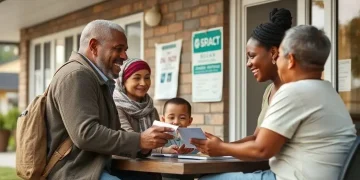Utility assistance for seniors in extreme heat: how to help

A assistência às utilidades para idosos em calor extremo inclui fornecer acesso a ambientes frescos, incentivar a hidratação, utilizar recursos comunitários e garantir a segurança em casa para prevenir doenças relacionadas ao calor.
Utility assistance for seniors in extreme heat is a pressing concern as temperatures rise. Have you ever wondered how to best support our elderly population in such conditions? In this article, we’ll explore effective strategies and resources available to ensure their well-being.
Understanding the risks of extreme heat for seniors
Understanding the risks of extreme heat for seniors is crucial for their safety and well-being. As temperatures increase, older individuals are particularly vulnerable and can face serious health issues.
The dangers of heat waves
Heat waves can cause dehydration, heat exhaustion, and even heat stroke. It is essential to recognize the signs of these conditions in seniors because they may not respond as quickly to heat as younger people do.
Factors that increase risk
Many factors can heighten the risk for seniors during extreme heat. Some of these include:
- Chronic health conditions, such as heart disease or diabetes.
- Medications that affect the body’s ability to regulate temperature.
- Limited mobility, which can make it difficult to stay cool.
- Social isolation, leading to less awareness of heat dangers.
Seniors may also have less access to air conditioning or ventilation, making them more susceptible to heat-related illnesses. It’s important to regularly check in on elderly neighbors or family members during hot days to ensure they are safe.
Another key aspect is hydration. Older adults often do not feel thirsty, even when their bodies need water. Encouraging regular fluid intake is vital, especially when temperatures soar. Water is essential, but drinks that contain electrolytes can also help maintain hydration levels.
Recognizing symptoms
It’s critical for caregivers and loved ones to recognize symptoms of heat-related illnesses. Signs to watch for include:
- Confusion or disorientation.
- Dizziness or fainting.
- Nausea or vomiting.
- Rapid heartbeat.
If you notice any of these symptoms, it is important to act quickly. Move the individual to a cooler area, provide fluids, and seek medical attention if necessary.
By being vigilant and aware of the risks, we can better protect our seniors from the harsh effects of extreme heat. Simple measures, like checking on them or helping them stay hydrated, can make a significant difference in their health and safety.
Available programs for utility assistance
Many available programs for utility assistance can help seniors manage their expenses during extreme heat. Understanding these options is crucial for ensuring that older adults stay safe and comfortable.
Government assistance programs
The government provides several programs aimed at helping seniors with utility costs. These programs often offer financial aid to cover energy bills or provide assistance in other forms. Here are some key programs:
- LIHEAP (Low Income Home Energy Assistance Program): This federal program helps low-income households pay for heating and cooling energy costs.
- Weatherization Assistance Program: This helps low-income families improve energy efficiency in their homes, which can reduce utility bills.
- PACE (Property Assessed Clean Energy): This program offers financing options for energy efficiency upgrades.
These programs are designed to prevent energy insecurity among vulnerable populations, especially during heatwaves. Seniors should check their eligibility for these programs to receive much-needed support.
Local and non-profit resources
Besides government programs, many local organizations and non-profits also offer assistance. These can be crucial resources for seniors looking for help. Some examples include:
- Community Action Agencies: These local agencies provide various service options, including utility assistance and referrals.
- Salvation Army: This organization often offers emergency financial assistance to help with utility bills.
- Local churches and charities: Many faith-based organizations have programs to assist those in need during extreme weather.
Seniors should reach out to local community centers or social services to find out more about these resources. Many of these organizations can provide immediate assistance or connect seniors with ongoing support.
Ultimately, staying informed about the available programs for utility assistance can empower seniors to seek help when they need it most. With the right resources, they can safely navigate the challenges posed by extreme heat.
Ways to support seniors during heat waves

Supporting seniors during heat waves is essential for their health and safety. As temperatures rise, there are several ways to ensure that elderly individuals stay cool and comfortable.
Provide access to cool environments
One effective method is to help seniors find accessible cool environments. This can include:
- Encouraging them to visit air-conditioned places like libraries, community centers, or shopping malls.
- Ensuring their homes are equipped with fans or air conditioning.
- Offering to spend time with them in cooler locations, providing companionship and support.
These simple actions can significantly reduce the risks associated with extreme heat.
Regular check-ins
Regular check-ins are also important during heat waves. Friends, family, or caregivers should:
- Call or visit seniors daily to monitor their well-being.
- Ask about their hydration levels and encourage them to drink water frequently.
- Help monitor for any signs of heat-related illnesses, such as dizziness or confusion.
Being proactive can help identify problems before they escalate.
In addition to regular communication, providing nutritious and hydrating meals can also help seniors cope with the heat. Foods with high water content, like fruits and vegetables, can keep them hydrated. It’s essential to encourage them to eat even if they feel less inclined to during hot weather.
Community resources
Utilizing community resources can further support seniors during heat waves. Local organizations may offer services like:
- Setting up cooling stations in neighborhoods.
- Providing transportation to cooling centers.
- Offering assistance programs to supply necessary items like fans or air conditioners.
Knowing what’s available in the community can make a significant difference in a senior’s ability to cope with extreme heat.
Ultimately, the goal is to create a network of support that not only addresses immediate needs but also fosters a sense of community and caring. By being attentive and resourceful, we can help protect seniors from the dangers of heat waves.
Community resources and initiatives
Community resources and initiatives play a vital role in assisting seniors during extreme heat. Local organizations often offer various services designed to keep elderly individuals safe and comfortable when temperatures rise.
Local cooling centers
One essential resource is the establishment of local cooling centers. These are places where seniors can go to escape the heat, usually equipped with air conditioning and other amenities. In addition to the cooling environment, seniors have access to:
- Social activities that promote interaction and reduce feelings of isolation.
- Information about health and safety during heat waves.
- Friendly staff who can assist with any immediate needs.
Visiting cooling centers can significantly lower heat-related health risks for seniors.
Transportation services
Another critical initiative is providing transportation services for seniors. Many community organizations and non-profits offer rides to cooling centers or grocery stores. This can ensure that they have access to:
- Essential supplies like water and healthy food.
- Healthcare appointments to monitor any heat-related health issues.
- Community events to engage with others and stay active.
Transportation services can be a lifesaver for those who cannot drive or lack access to public transit.
Furthermore, community outreach programs can help connect seniors with resources. These programs often have volunteers who check in on seniors and provide valuable information about:
- Local resources available to assist during heat waves.
- Emergency preparedness strategies.
- Health services that cater to their needs.
By utilizing community outreach, seniors can become more aware of the available support in their area, allowing them to take proactive steps in managing their well-being during extreme temperatures.
In summary, recognizing and utilizing community resources and initiatives can make a substantial difference for seniors facing the challenges posed by extreme heat. Together, these programs create a supportive network that fosters safety and better health outcomes.
Tips for creating a heat-safe environment
Creating a heat-safe environment is essential, especially for seniors. By taking a few simple steps, family members and caregivers can make a big difference in comfort and safety during hot weather.
Keep indoor spaces cool
One of the first things to do is to ensure that indoor spaces remain cool. This can be achieved by:
- Using fans and air conditioning to circulate air and lower temperatures.
- Closing curtains or blinds during the hottest part of the day to block out direct sunlight.
- Using light-colored curtains or shades to reflect sunlight.
Keeping the indoor environment cool is essential for seniors’ health.
Encourage hydration
Staying hydrated is crucial during heat waves. Seniors often forget to drink enough water. Some effective tips include:
- Encouraging them to drink water regularly, even if they do not feel thirsty.
- Offering hydrating snacks like fruits and vegetables, such as watermelon and cucumber.
- Providing beverages that are rich in electrolytes to help maintain hydration levels.
Keeping fluids accessible and reminding seniors to drink can prevent dehydration.
Another essential aspect is to create a “noisy” environment, meaning, turning on fans or air purifiers can be beneficial, as the sound can provide comfort. This can also help seniors feel less isolated inside their homes. Additionally, it is wise to monitor the temperature regularly using a thermometer to keep an eye on the indoor conditions.
Remove hazards
Taking steps to remove hazards can further enhance their safety. This includes:
- Ensuring that walkways and areas indoors are clear of clutter to prevent falls.
- Checking that fans and air conditioners are functioning properly before the heat arrives.
- Ensuring that windows are securely closed during extreme heat to prevent outdoor humidity from affecting indoor air quality.
By following these tips, caregivers and family members can create a safe and comfortable haven for seniors during extreme heat events.
FAQ – Perguntas frequentes sobre assistência aos idosos durante ondas de calor
Quais são os principais riscos do calor extremo para os idosos?
Os principais riscos incluem desidratação, insolação e exaustão por calor, que podem ser fatais se não tratados rapidamente.
Como posso ajudar um idoso a se manter hidratado durante o calor?
É importante incentivar os idosos a beber água frequentemente, além de oferecer alimentos ricos em água, como frutas e vegetais.
O que são centros de resfriamento e como funcionam?
Centros de resfriamento são locais onde os idosos podem ir para escapar do calor, com ar condicionado e recursos para seu conforto.
Quais recursos comunitários estão disponíveis para ajudar idosos durante o calor?
Recursos como transporte para centros de resfriamento, programas de verificação de bem-estar e assistência de organizações locais são comumente oferecidos.





